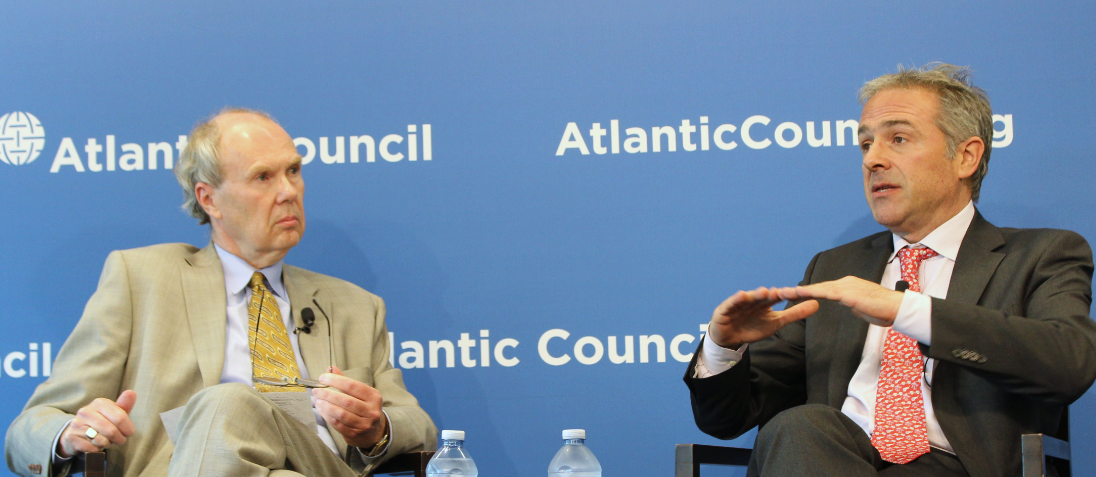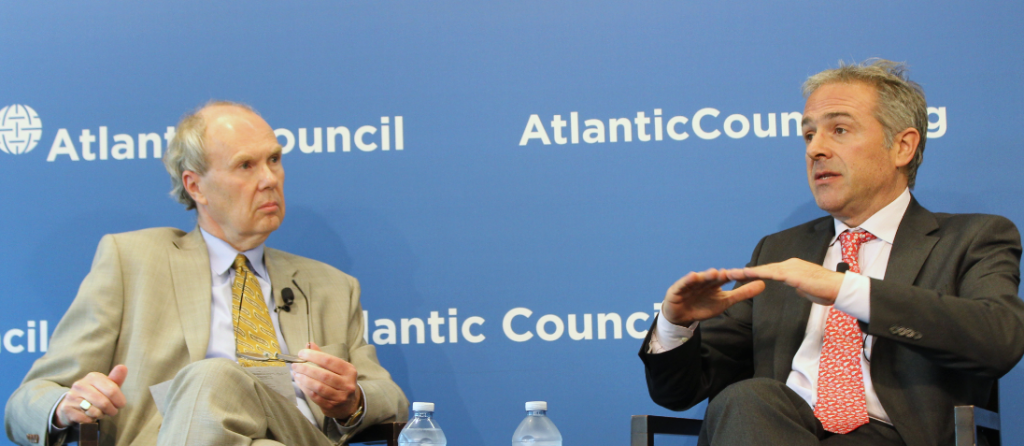 In a fireside chat hosted by the Atlantic Council’s Foresight, Strategy, and Risks Initiative on June 14, Financial Times columnist and commentator Edward Luce discussed the many challenges facing liberal democracies and the impact these challenges have on Western hegemony and the state of the liberal international order at large.
In a fireside chat hosted by the Atlantic Council’s Foresight, Strategy, and Risks Initiative on June 14, Financial Times columnist and commentator Edward Luce discussed the many challenges facing liberal democracies and the impact these challenges have on Western hegemony and the state of the liberal international order at large.
While recognizing that all liberal democracies do not share the same systemic characteristics, he pointed to the importance of the universal liberal principles that bind them together, such as individual rights, individual equality before the law, freedom of expression, and freely electing governments and holding them to account. Liberal democracies guided by these principles, he argued, are better than the alternative, however flawed they may be.
When asked to compare the tension within liberal democracies between permanent challenges, such as economic stagnation and its impact on the middle class, and what may be considered anomalous factors, such as President Donald J. Trump’s narrow election victory, Luce granted more weight to the former. He argued that growing pushback against globalization, especially from the middle class in the United Kingdom and the United States, is a force that has been brewing for several years prior to Brexit and the election of President Trump. He suggested that these forces would likely have persisted despite alternative political outcomes, arguing that, “the impact of globalization and of automation on the middle of our democracies is a crisis that didn’t suddenly mushroom in 2016, and it hasn’t suddenly vanished with Macron’s victory. This is a point that we and particularly our elites need to understand.” Furthermore, he stressed that this negative impact on the middle class is often misunderstood or ignored because human development indicators, such as literacy rates and child mortality, highlight the positive impact of globalization.
Luce cited rising income inequality and poor economic mobility as central contributors to middle class discontent—an issue that has been most significant in the United States and United Kingdom. “Rising inequality is okay when all incomes are rising…but the impact is very different when it is perceived to be a zero-sum game over fixed resources,” he stated. To this point, he noted that declining labor force participation has spurred a crisis in morale as people feel that they are not contributing to society because they are out of work. Thus, this loss of dignity makes joblessness both an economic and a human problem.
To address these grievances more effectively, Luce offered several recommendations, summarily stating, “We need to update how we help people when we hit economic rainy days.” He therefore called for a Marshall Plan for the middle class and greater cooperation with employers to tackle issues such as worker retraining and investing in upgrading curriculums throughout workers’ lifetimes. Luce also noted that finding the political will to implement effective policies presents a far greater challenge than developing the policies themselves.
Luce spoke at length on his concerns about the Trump administration and what its actions meant for the liberal international order. He asserted that unlike what many claim, Trump’s views are not realist, likening them instead to a Hobbesian brutalist approach to foreign policy. The veracity of this worldview, he suggested, has contributed to a new phase in the United States’ unwillingness to be the, “Hercules that upholds the global order,” a transition that he argues has been underway for several decades. Because of American disengagement, other countries will now look elsewhere for reliable partners to guarantee their security.
Luce did not mince words in his criticism of the president, stressing that the notion that the president will “mellow” in the coming months is “preposterous.” However, when pressed on whether institutions would constrain what he considered to be a disruptive actor in President Trump, he predicted that the US system would not fail. He expressed confidence that the Madisonian system of checks and balances is and will continue to work, seeing recent events as a sign that Republican legislators would use their prerogative to check the executive branch. “I do think the Constitution is working, and that’s not nothing,” he added.
In contrast, Luce painted a less optimistic picture for the United Kingdom as the country anticipates Brexit negotiations. He argued that even a “soft” Brexit, which would retain the United Kingdom’s access to the European single market, deprives the country of every bit of sovereignty that it thought it was getting back.
Even after addressing the many challenges facing liberal democracies, Luce reaffirmed his belief in Western liberalism as a political philosophy and predicted that it has the capacity to withstand current pressures. When he was asked about the strength of the language used in the title of his book, Luce shared a story about exactly why he had chosen the term “retreat” to describe the current state of Western liberalism. “My publishers wanted this to be called The Collapse of Western Liberalism…but I won that argument because it’s not about the collapse. It’s about the retreat, and retreat implies the ability to regroup.”
Mike Rossi is an intern with the Foresight, Strategy, and Risks Initiative in the Atlantic Council’s Brent Scowcroft Center on International Security.
Image: Mathew Burrows, director of the Foresight, Strategy, and Risks Initiative, (left), discusses what the Trump administration means for the future of the United States and Europe with Financial Times columnist and commentator Ed Luce.
